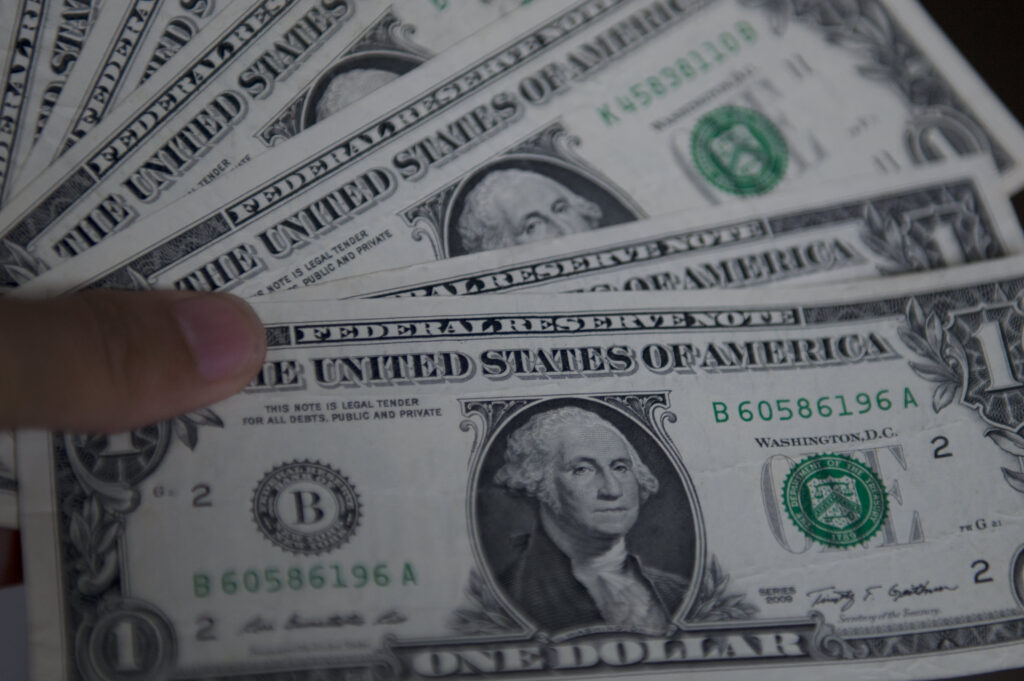The U.S. dollar stabilized in early European trade Tuesday, while the yen slumped after the Bank of Japan maintained its dovish course at its latest policy-setting meeting.
At 05:00 ET (10:00 GMT), the Dollar Index, which tracks the greenback against a basket of six other currencies, traded largely unchanged at 102.190, having experienced a strong rebound from four-month lows in the past two sessions.
Dollar steadies after sharp losses
The dollar has steadied of late after sharp recent losses as a number of Fed policymakers attempt to rein in expectations of a number of rate cuts next year in the wake of the U.S. central bank’s latest policy meeting.
BofA Global Research said on Monday that it expects the U.S. Federal Reserve to deliver four 25-basis point rate cuts next year, starting in March – an increase from its previous stance of a total 75 bps.
However, some Fed officials are now attempting to push back on this aggressive dovish repricing.
Chicago Fed President Austan Goolsbee said on Monday that the central bank is not precommiting to cutting interest rates soon and swiftly
“I was confused a bit … was the market just imputing ‘Here’s what we want them to be saying.’ I thought there seemed to be some confusion about how the FOMC (Federal Open Market Committee) even works. We don’t debate specific policies speculatively about the future,” he said.
Goolsbee is scheduled to speak once more later Tuesday, while Atlanta Fed President Raphael Bostic is also due to talk about the U.S. economy at a separate event.
Yen slumps after BOJ stays dovish
Elsewhere, USD/JPY traded 1.3% higher at 144.59 after the Bank of Japan held interest rates at negative levels and offered no cues on when it planned to begin tightening policy.
Governor Kazuo Ueda has previously offered some signals on potential policy tightening in 2024, but he again reiterated the need for ultra-loose policy in the near-term, citing increased economic risks to Japan.
Still, the yen remained close to recent five-month highs against the dollar, having recovered sharply following dovish signals from the Fed last week.
“The Bank kept its dovish guidance unchanged (“take additional monetary easing steps without hesitation if needed”) which forced markets to abandon speculation of a rate hike in January,” said analysts at ING, in a note.
Euro gains despite falling CPI
EUR/USD rose 0.2% to 1.0942, following the release of a final reading of eurozone inflation in November.
This showed that consumer prices are retreating, with the November figure falling 0.6% on a monthly basis, an annual increase of 2.4%, down from 2.9% the prior month.
That said, ECB policymaker Yannis Stournaras, usually known as a dove, on Monday joined a growing chorus of central bank officials pushing back against market expectations for a spring rate cut, helping the single currency post gains against the dollar.
“EUR/USD can trade above 1.10 during the holiday period as the dollar enters a seasonally soft period, but rate differentials are still too depressed to argue for a sustainable rally above 1.10 just yet,” ING added.
GBP/USD rose 0.4% to 1.2691, with U.K. inflation, due for release on Wednesday, still seen way above the Bank of England’s 2% medium-term target, making rate cuts a more distant prospect.
Elsewhere, USD/CNY traded 0.1% higher at 7.1424, before a People’s Bank of China decision on loan prime rates later this week. The central bank is widely expected to keep the rate at record lows, as it struggles to foster economic growth while supporting the yuan.



